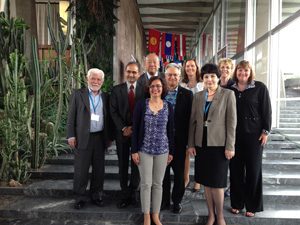By Deron Hamel
A World Health Organization (WHO) resolution that was unanimously passed earlier this year could create large-scale, positive change in epilepsy treatment across the globe, says Mary Secco, an Ontario advocate for people with epilepsy.

Secco, who is co-chair of the International League Against Epilepsy’s (ILAE’s) Global Outreach Task Force as well as a volunteer with a worldwide organization called the International Bureau for Epilepsy (IBE), says with the WHO committing to further epilepsy care and research, the large epilepsy treatment gap in developing countries could be significantly narrowed.
Delegates at the WHO’s general assembly in Geneva, Switzerland, unanimously approved a resolution in May to improve epilepsy care and research around the world.
As an IBE volunteer, Secco met with the Public Health Agency of Canada and Foreign Affairs Canada to encourage support for the resolution. She also addressed delegates from the World Health Assembly’s 194 member states to underscore the importance of the resolution passing.
In her presentations, Secco noted that an estimated 50 million people worldwide are living with epilepsy and that there is a large treatment gap in the condition.
For instance, 75 per cent of people living with epilepsy have never received medication for treatment, despite the fact that epilepsy is treatable and it would cost as little as US$5 per year for medication for some people.
“To me, (the treatment gap) is a huge social injustice,” Secco tells Voices of Epilepsy. “We have strategies for malaria, for polio, we’re putting so much money towards other things, and we have never looked at epilepsy and we could make such a difference by just having it on governments’ radar.”
Momentum supporting the WHO to commit to a focus on epilepsy treatment has been building in the past year. In December, China requested that epilepsy be put on the WHO’s agenda. In February, seven countries formally sponsored the resolution: China, Russia, Maldives, Argentina, Iran, Japan and Panama.
During the May general assembly, 43 nations spoke to support the resolution, with 19 countries – including Canada – co-sponsoring it.
With the passing of the resolution, the WHO is now accountable for ensuring steps are taken to close the treatment gap. At the World Health Assembly in 2018, the WHO will have to demonstrate steps the organization has taken to improve epilepsy care worldwide.
“We’ll see governments putting epilepsy medications in stock; we’ll see countries putting epilepsy training within their health-care system and having a plan to treat people with the condition in their countries,” says Secco, who is travelling to Istanbul, Turkey, this month to attend a conference where she will be training delegates on how they can use the WHO resolution as leverage to improve epilepsy care.
“There are measurable outcomes that the WHO has to bring back to us in 2018. … This is huge for people with epilepsy. It gives us the political will now to work with our governments to see this go into action.”
If you have feedback on this story, or have a story of your own that you would like to share, please contact the newsroom at 800-294-0051, ext. 23, or e-mail deron(at)axiomnews.com. You can also leave a comment below.





